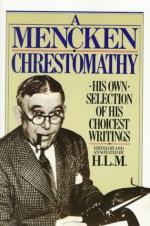
|
| Name: _________________________ | Period: ___________________ |
This test consists of 15 multiple choice questions and 5 short answer questions.
Multiple Choice Questions
1. In Chapter 7, Mencken notes that there are too few books written about what subject?
(a) Women.
(b) True crime.
(c) Taxes.
(d) Death.
2. What does democracy ruin, according to Mencken?
(a) The means of production.
(b) Individual greatness.
(c) Common sense.
(d) Wealth.
3. What is Mencken's belief about crime?
(a) Crime is impossible in aristocratic circles.
(b) Crime is primarily a social invention.
(c) Crime is primarily a product of capitalist society.
(d) Crime is primarily a legal invention.
4. How does Mencken feel about the overall capacity for virtue in the human race?
(a) Virtue is a nonsense term, because everything is relative.
(b) Most people are virtuous, but a few people spoil it for everyone.
(c) Everyone is virtuous, it's just a matter of uncovering it.
(d) Very few men are virtuous.
5. What does Mencken believe about the concept of evil?
(a) Evil is just another word for good; it's all relative.
(b) Evil is the reason why children are born.
(c) Evil is real, and exists all around us.
(d) Evil is a made-up term, and does not really exist.
6. What kind of men does a democracy produce?
(a) Depressing men full of nostalgia.
(b) Energetic men with too much time on their hands.
(c) Stupid men who can barely master the multiplication tables.
(d) Noble, confident men who do not envy others.
7. What is the subject of Chapter 7?
(a) Quackery.
(b) Death.
(c) Classical composers.
(d) Taxes.
8. What is Mencken's belief about the concept of sin?
(a) Sin is a made-up term, and does not really exist.
(b) Sin is just another word for good deed; it's all relative.
(c) Sin is real, and exists all around us.
(d) Sin is the reason why children are born.
9. What is the problem with trying to punishment a government for not working well?
(a) The government itself is in control of the means of punishment.
(b) There are too many bureaucracies and it is impossible to determine who to punish.
(c) Voting is usually rigged.
(d) Punishing the government will lead to revenge tactics.
10. How does Mencken define government?
(a) A collection of the looniest among us.
(b) A war on the poor.
(c) A dozen men who can't do anything right.
(d) A conspiracy against superior men.
11. Mencken sees that too often any discussion of suicide is rooted in what incorrect notion?
(a) Death is painless.
(b) Death is painful.
(c) The family would suffer in a suicide.
(d) Killing oneself is an expensive proposition.
12. What aspect of human nature fuels the democratic system of government?
(a) Charity.
(b) Envy.
(c) Grace.
(d) Murderous violence.
13. What kind of promises do politicians make?
(a) Ones they cannot deliver.
(b) Ones they have polled voters about.
(c) Ones they have no intention of fulfilling.
(d) Ones they can fulfill.
14. What kind of sense of right and wrong do children have?
(a) Children are born with a sense of right and wrong, which is then corrupted by society.
(b) Children are born without a sense of right and wrong, but they develop it without society's interference.
(c) Children are born with a sense of right and wrong, and they carry this into adulthood.
(d) Children are born without a sense of right and wrong, and society imposes this sense upon them.
15. What does Mencken see as the problem with contemporary Protestantism?
(a) There are few, sensible, centrist Protestants left.
(b) All modern Protestants are wishy-washy centrists.
(c) Protestants suffer from a Jewish weakness for poetry.
(d) Protestants have forgotten the teachings of Jesus Christ.
Short Answer Questions
1. How does Mencken describe Oliver Wendell Holmes?
2. What is the "average man's" opinion of government?
3. What was the most damning effect of the Civil War, in regard to the South?
4. Punishment for crime is too often what, according to Mencken?
5. What is Mencken's opinion of romantic love?
|
This section contains 727 words (approx. 3 pages at 300 words per page) |

|




